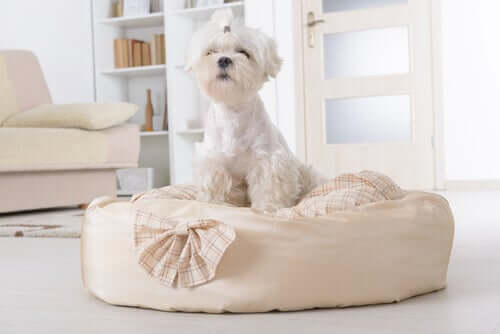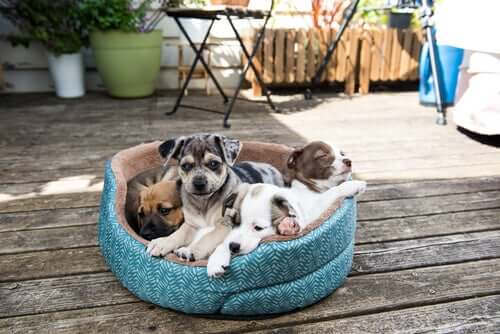How to Choose the Best Dog Bed

Our pets deserved a place to sleep that perfectly fits their needs. Especially since they spend many hours each day sleeping! It’s important to choose carefully between all the different available options. In this article, we’ll tell you how to choose the best dog bed for your pup.
Why get a dog bed?
In addition to being a very comfortable place for your dog to sleep, a dog bed also helps keep your dog warm in the winter and cool in the summer. Besides, it gives your dog a quiet spot to relax without being disturbed. It also gives dogs the security and protection they need, especially for small dogs or dogs that scare easily.

Additionally, a dog bed can prevent your dog from searching for another place to sleep, like your bed or the couch. Also, if you have an old or sick dog, then a bed can help keep them comfortable and pain-free.
Tips for choosing the best dog bed
Now is the time to ignore your own preferences and instead think about what your dog needs. We recommend that you ask for advice at a pet store or take these tips into account:
1. Suitable size
There are so many different styles, types, and sizes of dog beds to choose from. The size of the bed should depend on the size and breed of your pet. Obviously, a chihuahua will need a different size one to a German sheepdog! You’ll need to measure your canine before going to the store (height and length). It’s also helpful to tell the seller the breed, age and weight of your dog.
2. How your dog sleeps
If your furball loves to keep curled up in a ball, choose a bed with padded edges. Even better if it’s oval or round. This way your dog will feel more protected and comfortable. On the other hand, if your dog prefers to sleep all stretched out, it’s best to get a bed that’s rectangular without any sides.
3. Time of the year
There are beds that are best for winter and others that are better for summer. It all depends on what materials it’s made of. When it’s cold, you can use a terrycloth bed to protect your dog from low temperatures. In hot weather, use a cooling mat similar to a mattress so your dog doesn’t get overheated and end up sleeping on the floor.
4. Cleaning a dog bed
The best dog beds can be cleaned without any problems. Just think about how dirty your dog gets from playing outside, being in the rain etc. So, it’s a good idea to buy a bed that comes with a removable cover. That way you can throw the cover in the washing machine and that’s that. Goodbye dirt and mites!
5. Location
Where will you put your dog’s new dog bed? If you don’t have that much space, buy a dog bed that’s comfortable for your dog, but don’t go overboard! If you’re looking for a bed that can stay outside, there are special dog beds that are made with waterproof materials that prevent the bed from deteriorating quickly.
6. Your dog’s habits
Keep in mind that some dogs may want to bite or chew on beds made of certain materials like wicker. Or your dog could urinate on it. Keep these things in mind before you decide on the best dog bed for your dog.
7. Types of beds
There are a wide variety of dog beds to choose from, from the most basic to much more sophisticated. A classic is a wicker basket with a nice, fluffy cushion inside that you can remove and wash without a problem. Another alternative is a mat, which is comfortable, waterproof, and easy to transport and clean. In the winter, you can always put a blanket under the mat so that it doesn’t get too cold. In the summer, you can put in some fabric to help soak up any sweat.

Lastly, there are fluffy beds, designed mostly for smaller breeds. They are safe for the dog and allow them to sleep off the ground. Some are almost even at the same height as a normal bed!
Our pets deserved a place to sleep that perfectly fits their needs. Especially since they spend many hours each day sleeping! It’s important to choose carefully between all the different available options. In this article, we’ll tell you how to choose the best dog bed for your pup.
Why get a dog bed?
In addition to being a very comfortable place for your dog to sleep, a dog bed also helps keep your dog warm in the winter and cool in the summer. Besides, it gives your dog a quiet spot to relax without being disturbed. It also gives dogs the security and protection they need, especially for small dogs or dogs that scare easily.

Additionally, a dog bed can prevent your dog from searching for another place to sleep, like your bed or the couch. Also, if you have an old or sick dog, then a bed can help keep them comfortable and pain-free.
Tips for choosing the best dog bed
Now is the time to ignore your own preferences and instead think about what your dog needs. We recommend that you ask for advice at a pet store or take these tips into account:
1. Suitable size
There are so many different styles, types, and sizes of dog beds to choose from. The size of the bed should depend on the size and breed of your pet. Obviously, a chihuahua will need a different size one to a German sheepdog! You’ll need to measure your canine before going to the store (height and length). It’s also helpful to tell the seller the breed, age and weight of your dog.
2. How your dog sleeps
If your furball loves to keep curled up in a ball, choose a bed with padded edges. Even better if it’s oval or round. This way your dog will feel more protected and comfortable. On the other hand, if your dog prefers to sleep all stretched out, it’s best to get a bed that’s rectangular without any sides.
3. Time of the year
There are beds that are best for winter and others that are better for summer. It all depends on what materials it’s made of. When it’s cold, you can use a terrycloth bed to protect your dog from low temperatures. In hot weather, use a cooling mat similar to a mattress so your dog doesn’t get overheated and end up sleeping on the floor.
4. Cleaning a dog bed
The best dog beds can be cleaned without any problems. Just think about how dirty your dog gets from playing outside, being in the rain etc. So, it’s a good idea to buy a bed that comes with a removable cover. That way you can throw the cover in the washing machine and that’s that. Goodbye dirt and mites!
5. Location
Where will you put your dog’s new dog bed? If you don’t have that much space, buy a dog bed that’s comfortable for your dog, but don’t go overboard! If you’re looking for a bed that can stay outside, there are special dog beds that are made with waterproof materials that prevent the bed from deteriorating quickly.
6. Your dog’s habits
Keep in mind that some dogs may want to bite or chew on beds made of certain materials like wicker. Or your dog could urinate on it. Keep these things in mind before you decide on the best dog bed for your dog.
7. Types of beds
There are a wide variety of dog beds to choose from, from the most basic to much more sophisticated. A classic is a wicker basket with a nice, fluffy cushion inside that you can remove and wash without a problem. Another alternative is a mat, which is comfortable, waterproof, and easy to transport and clean. In the winter, you can always put a blanket under the mat so that it doesn’t get too cold. In the summer, you can put in some fabric to help soak up any sweat.

Lastly, there are fluffy beds, designed mostly for smaller breeds. They are safe for the dog and allow them to sleep off the ground. Some are almost even at the same height as a normal bed!
This text is provided for informational purposes only and does not replace consultation with a professional. If in doubt, consult your specialist.








